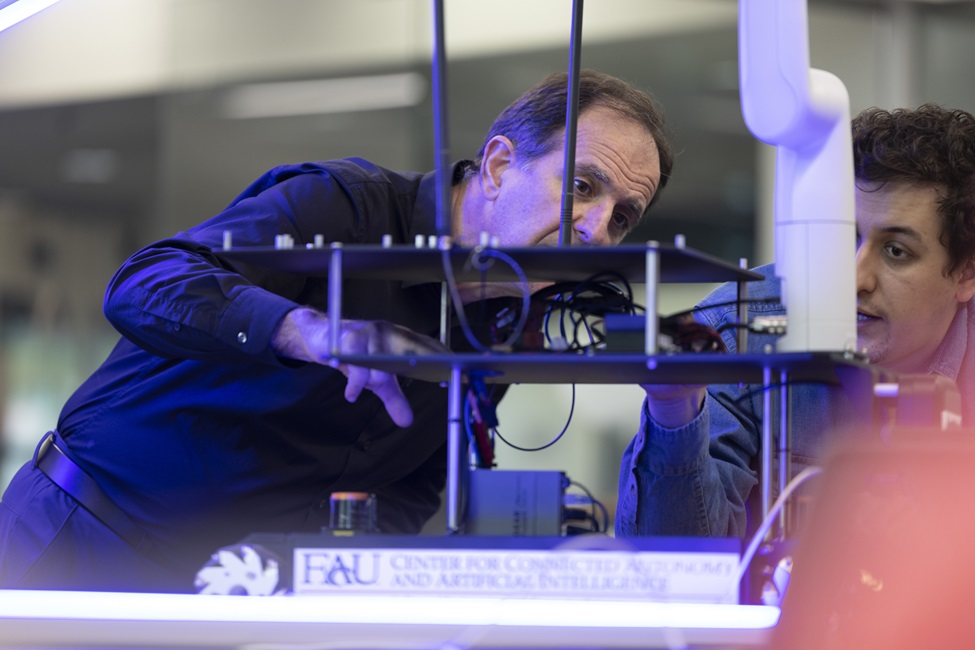FAU CA-AI Research Highlighted in 'Nature Reviews'

(Photo by Alex Dolce)
Florida Atlantic Center for Connected Autonomy and Artificial Intelligence (CA-AI.fau.edu) researchers “cracked the code” on interference when machines need to talk with each other – and people. Electromagnetic waves make wireless connectivity possible but create a lot of unwanted chatter. Referred to as “electromagnetic interference,” this noisy byproduct of wireless communications poses formidable challenges in modern day dense Internet of Things and AI robotic environments. With the demand for lightning-fast data rates reaching unprecedented levels, the need to quell this interference is more pressing than ever.
Equipped with a breakthrough algorithmic solution, researchers from FAU Center for Connected Autonomy and AI, within the College of Engineering and Computer Science , and FAU Institute for Sensing and Embedded Network Systems Engineering (I-SENSE), have figured out a way to do that. Their method, which is a first, dynamically fine-tunes multiple-input multiple-output (MIMO) links, a cornerstone of modern-day wireless systems such as Wi-Fi and cellular networks.
The researchers’ game changing approach, just published in a special issue of the journal of the Institute of Electrical and Electronics Engineers (IEEE) on electromagnetics and information theory and immediately featured as a research highlight in “Nature Reviews,” demonstrates how their algorithmic method sculpts wireless waveforms to navigate the crowded frequency band. By simultaneously optimizing transmission in space and time, this algorithm could pave the way for pristine communication channels.
In field demonstrations, the researchers dynamically optimized MIMO wireless waveform shapes over a given frequency band to manage and avoid interference in machine-to-machine communications and showed the effectiveness of this method in real-world scenarios where interference is a common problem.
“We have pioneered the conceptual and practical groundwork for machines outfitted with multiple antennas to autonomously determine the most effective waveform shapes in both time and space domains for communication within a designated frequency band, even among extremely challenging interference and disturbances,” said Dimitris Pados, Ph.D., senior author, professor, director of the CA-AI and a fellow of I-SENSE in the Department of Electrical Engineering and Computer Science. “By employing dynamic waveform machine learning in tandem across space and time, we believe that we have ‘cracked the code’ on mitigating electromagnetic interference.”
Researchers first conducted extensive simulations to validate the efficacy of this method against a barrage of interference scenarios from near-field to far-field and in both light and dense interference scenarios. These simulations highlighted the ability of the optimized waveforms, particularly joint space-time optimization, to maintain “clean” communications in extreme mixed-interference environments.
“In the realm of autonomous systems and machine-to-machine communications, secure, reliable and ‘clean’ communications are paramount, underscoring the importance of this breakthrough research at Florida Atlantic,” said Stella Batalama, Ph.D., dean, FAU College of Engineering and Computer Science. “In the midst of chaos in modern communication, this innovative research offers a very promising avenue to address interference challenges in machine-to-machine communications where there are high volumes of devices and multiple networks.”
Study co-authors of the IEEE journal publication are Sanaz Naderi, first author and graduate research assistant; and George Sklivanitis, Ph.D., Schmidt Research Associate Professor and I-SENSE fellow; within the FAU College of Engineering and Computer Science; and Elizabeth Serena Bentley, Ph.D.; Joseph Suprenant; and Michael J. Medley, Ph.D., all with the United States Air Force Research Laboratory.
-FAU-
Latest News Desk
- After Cancer: Study Explores Caring-Healing Modalities for SurvivorsResearch from FAU's Christine E. Lynn College of Nursing highlights how caring-healing methods like mindfulness can ease distress and build resilience in cancer survivors.
- FAU Researchers 'Zoom' in for an Ultra-Magnified Peek at Shark SkinWhat gives shark skin its toughness and sleek glide? Tiny, tooth-like denticles. Researchers used electron microscopy to reveal how these structures shift with age, sex, and function in bonnethead sharks.
- FAU Receives $1.6M Gift for Student Entrepreneur ScholarshipsFlorida Atlantic University received a $1.6 million gift from long-time Boca Raton resident Bob Schattner, which will be used to continue providing scholarships that he established 15 years ago in perpetuity.
- FAU Lands $3M Federal Grant to Prevent Substance Use in At-risk Youth"Rising Strong" will support more than 3,000 South Florida youth with trauma-informed, evidence-based prevention, empowering vulnerable populations to build resilience and choose substance-free futures.
- FAU Research: Logistics Expansion Slows as Transportation Prices DropThe Logistics Managers' Index had the lowest overall reading since March as the supply chain reacts to economic uncertainty, according to researchers from Florida Atlantic University and four other schools.
- World's First Bench-to-Bedside MRI, Focused Ultrasound System UnveiledThe newly expanded FAU NeuroInnovate Center is the first in the world to integrate advanced MRI and focused ultrasound technologies into a single, unified platform for both preclinical and clinical research.






